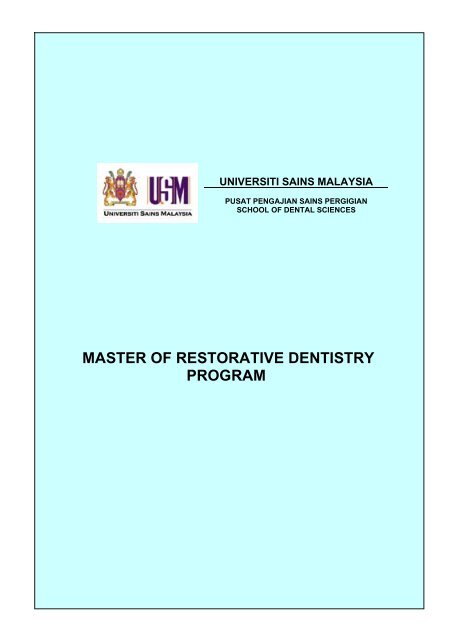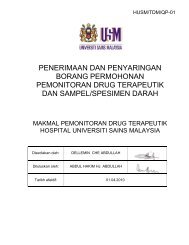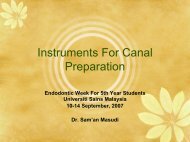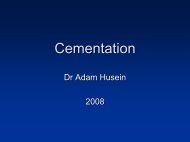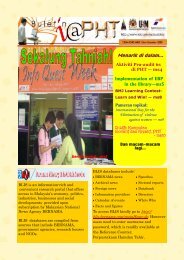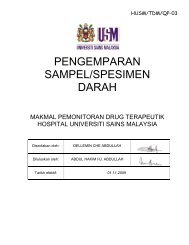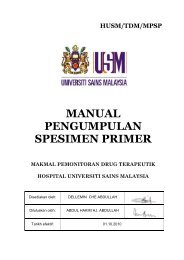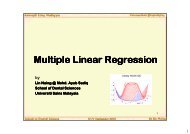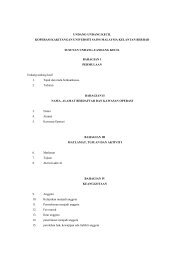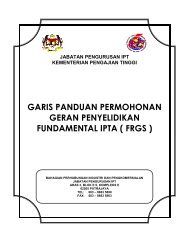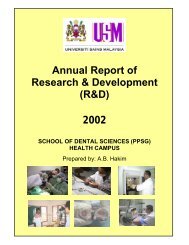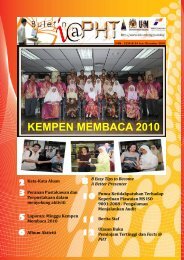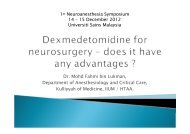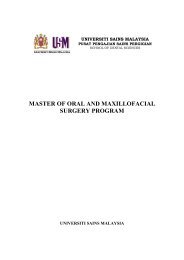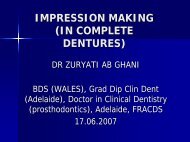MASTER OF RESTORATIVE DENTISTRY PROGRAM - USM
MASTER OF RESTORATIVE DENTISTRY PROGRAM - USM
MASTER OF RESTORATIVE DENTISTRY PROGRAM - USM
You also want an ePaper? Increase the reach of your titles
YUMPU automatically turns print PDFs into web optimized ePapers that Google loves.
UNIVERSITI SAINS MALAYSIA<br />
PUSAT PENGAJIAN SAINS PERGIGIAN<br />
SCHOOL <strong>OF</strong> DENTAL SCIENCES<br />
<strong>MASTER</strong> <strong>OF</strong> <strong>RESTORATIVE</strong> <strong>DENTISTRY</strong><br />
<strong>PROGRAM</strong>
UNIVERSITI SAINS MALAYSIA<br />
Master of Restorative Dentistry<br />
(Conservative Dentistry, Periodontics or Prosthodontics)<br />
1. INTRODUCTION<br />
The Master of Restorative Dentistry is a new specialty program, which<br />
will be offered by the School of Dental Sciences, Universiti Sains<br />
Malaysia. This program comprises of specialty in the field of<br />
Conservative Dentistry, Periodontics and Prosthodontics.<br />
2. BACKGROUND<br />
The Master of Restorative Dentistry in the specialty of Conservative<br />
Dentistry, Periodontics or Prosthodontics is established to train dental<br />
graduates to become restorative specialists. Up to the year 2005, there<br />
are only three restorative specialists in the Ministry of Health.<br />
Therefore, the establishment of the programme by the School of Dental<br />
Sciences, <strong>USM</strong> could help in fulfilling the country’s needs to increase<br />
the number of specialists to accommodate for the increase in<br />
population and standard of oral health care. Other than that, as<br />
knowledge of dentistry and technology of dental materials advances,<br />
more graduates become interested to further their study to update their<br />
knowledge and skills. Up to date, the University of Malaya is the only<br />
university in our country offering dental graduates to pursue their study<br />
in the specialty of Restorative Dentistry. As a result, the need for a<br />
similar program established by the School of Dental Sciences is<br />
recommended to increase the number of restorative specialists in our<br />
country.<br />
3. MARKET SURVEY<br />
The Master of Restorative Dentistry program has been initiated upon<br />
request by the Oral Health Division, Ministry of Health to increase the<br />
number of restorative specialists in the country. Some requests were<br />
received from international students.<br />
4. GENERAL OBJECTIVES<br />
The Master of Restorative Dentistry (Conservative Dentistry,<br />
Periodontics or Prosthodontics) degree has several objectives. The<br />
degree is designed to provide the candidates with the following:<br />
i) Opportunity to advance their knowledge and skills in a specialized<br />
area of restorative dentistry,<br />
2
ii) Educational component required for the specialist training, and<br />
iii) Knowledge and skills in research methodology, critical evaluation of<br />
data and originality in thought and research design.<br />
5. SPECIFIC OBJECTIVES<br />
On completion of the Master of Restorative Dentistry course, the<br />
candidates should be able to:<br />
1) Acquire advanced knowledge and greater understanding of dentistry<br />
applicable to the field of restorative dentistry.<br />
2) Demonstrate special skills in the provision of clinical services<br />
applicable to the field of restorative dentistry.<br />
3) Demonstrate highly developed problem-solving abilities in the<br />
discipline area, characterized by flexibility and multidisciplinary of<br />
approach.<br />
4) Demonstrate a detailed understanding of the principles, current<br />
developments and research methods applicable to the field of<br />
restorative dentistry.<br />
5) Evaluate and synthesize the research and professional literature in<br />
the discipline.<br />
6) Prepare individuals for a career in the field of restorative dentistry.<br />
7) Maintain self- development by continuing education and knowledge<br />
updating.<br />
6. <strong>PROGRAM</strong> <strong>OF</strong> STUDY<br />
The Master of Restorative Dentistry program is a CLINICAL<br />
COURSEWORK program in which the research component comprises<br />
about thirty (30) percent of the whole program of the study.<br />
7. DURATION <strong>OF</strong> STUDY<br />
The minimum duration of study is four (4) years while the maximum is<br />
seven (7) years. However, each case is judged on a case-by-case<br />
basis on appeal from exemption from the FRACDS (Fellowship of the<br />
Royal Australasian College of Dental Surgeons) Primary Examination.<br />
3
8. STUDY FEE<br />
The fee for the Master of Restorative Dentistry ((Conservative<br />
Dentistry, Periodontics or Prosthodontics) program is RM 26,000 per<br />
year.<br />
9. ADMISSION REQUIREMENTS<br />
Qualifications for admission<br />
The candidate should:<br />
a) Have a bachelor’s degree in Dentistry (BDS, DDS or an equivalent<br />
degree).<br />
b) Have at least three years post-registration experience in dentistry,<br />
either in the Ministry of Health (MOH) or other institutions<br />
recognized by the University’s Senate.<br />
c) Obtain at least a credit in Bahasa Malaysia in SPM (for Malaysian<br />
citizens) or equivalent examination.<br />
d) Pass the assessment for admission, which has been decided by<br />
the School and Ministry of Health.<br />
e) Have good physical and mental health.<br />
10. ADMISSION APPLICATION<br />
Application forms can be obtained from the Institute of Graduate<br />
Studies by attaching one envelope (measuring 28cm × 40cm) and RM<br />
1.20 stamp. Please write “Postgraduate Studies Application” and<br />
“Master of Restorative Dentistry” on the top left of the envelope. The<br />
candidates also need to enclose a Money Order or Postal Order of<br />
RM 10.00 under the name of Universiti Sains Malaysia and send it to:<br />
Dean,<br />
Institute of Graduate Studies,<br />
Universiti Sains Malaysia, 11800,<br />
Minden, Penang<br />
Every application must be attached with academic qualifications and<br />
certified clinical experience and 2 passport photographs.<br />
All applicants must be certified by the School board and the final<br />
decision will be made by the University Senate.<br />
Any queries pertaining to the contents of program, program structure<br />
and others, can be directed to the School of Dental Sciences,<br />
Universiti Sains Malaysia, Health Campus, 16150 Kubang Kerian,<br />
Kelantan.<br />
4
11. <strong>PROGRAM</strong> STRUCTURE<br />
This program shall consist of three phases: Phase I, II and III.<br />
11.1 Phase1 is the first year of the Master of Restorative Dentistry<br />
program. It comprises of instructions in Basic Medical and Dental<br />
Science subjects such as Pathology, Physiology, Biochemistry,<br />
Microbiology, Anatomy and Histology over a period of six (6) months<br />
The candidates have to sit for their primary examination (equivalent to<br />
primary FRACDS) at the end of semester I Year 1. The final six (6)<br />
months of Year 1 comprises of operative techniques in the skill<br />
laboratory and clinical training in General Dental Practice (GDP) as<br />
well as introducing the students to research methodology and<br />
biostatistics.<br />
11.2 Phase II is the second year of the Master of Restorative program. It<br />
comprises of a research component in the specialty option chosen by<br />
the students. There are also clinical practices in conservative,<br />
prosthetics and periodontics throughout the year.<br />
11.3 Phase III is the third and fourth year of the Master of Restorative<br />
Dentistry program. It comprises of complex clinical practices in the field<br />
of conservative dentistry, prosthetics or periodontics chosen by the<br />
candidates. There will also be course work such as lectures and<br />
seminar. Research component in the specialty option continues,<br />
leading to the submission of a dissertation three months before the end<br />
of Year 3 followed by a viva defense.<br />
The Year Four program comprises of a three (3) month clinical<br />
attachment in the specialty option, either in the Faculty of Dentistry,<br />
University of Malaya or other clinical training centre recognized by the<br />
University. Advanced clinical practices and coursework in the specialty<br />
option continues until near the completion of the course.<br />
Table 1 on page 6 shows the outline of the Master of Restorative<br />
Dentistry program<br />
5
Table 1. OUTLINE <strong>OF</strong> STUDY <strong>PROGRAM</strong> STRUCTURE<br />
Phase Year Duration Contents<br />
I 1<br />
II 2<br />
6 months<br />
6 months<br />
12 months<br />
Basic Medical and Dental<br />
Sciences<br />
Assessment:<br />
Primary Examination<br />
(equivalent to FRACDS).<br />
Introduction to Research<br />
Methodology and Biostatistics<br />
Operative Techniques<br />
Clinical Practices (GDP)<br />
Course Work<br />
Assessment:<br />
Continuous Assessment<br />
Research Project<br />
Clinical Practices<br />
Course Work<br />
Assessments:<br />
Continuous Assessment<br />
III<br />
3<br />
6 months<br />
6 months<br />
Clinical Practices<br />
Research<br />
Course Work<br />
Assessment:<br />
Continuous Assessment<br />
Year 3 Examination<br />
(equivalent to FRACDS Final<br />
Examination)<br />
Clinical Practices<br />
Research<br />
Course Work<br />
Assessments:<br />
Submission and Defense of<br />
Dissertation<br />
4 3 months<br />
9 months<br />
Clinical Attachment<br />
Advanced Clinical Practices<br />
Course Work<br />
Assessments:<br />
Continuous Assessment<br />
Final Case Presentation<br />
6
DETAILS <strong>OF</strong> STUDY <strong>PROGRAM</strong><br />
In general, approximately 50% of time in the program is committed to clinical<br />
training and experience. The remainder of the time is committed to<br />
coursework (20%) and research (30%). This distribution accords with the<br />
international best practice for clinical specialisation in dentistry.<br />
The weightage of clinical training and exposure in the disciplines of<br />
Conservative Dentistry, Prosthodontics and Periodontics will be distributed<br />
almost evenly during the first two years of the Master of Restorative Dentistry<br />
program. At the beginning of Year 3, the candidates can further decide to<br />
specialize in either one of the specialties which is Conservative Dentistry,<br />
Periodontics or Prosthodontics.<br />
The candidates will also be required to participate in the undergraduate<br />
teaching programs of the School at an appropriate level, as part of their<br />
training. This will normally consist of preclinical and clinical supervision of<br />
undergraduate students, for at least one session per week throughout the<br />
Master of Restorative Dentistry program.<br />
YEAR 1<br />
The candidates will study Basic Medical and Dental Sciences subjects for 6 months<br />
and sit for the Primary examination equivalent to primary examination of the<br />
Fellowship of the Royal Australasian College of Dental Surgeons (FRACDS) in early<br />
December. The candidates will also need to undertake sessions in operative<br />
techniques and clinical training in General Dental Practice for the final six months.<br />
They will also attend the Research Methodology and Basic Statistics classes to<br />
introduce them to critical analysis of the literature, planning a research design and<br />
protocol and writing a thesis. This is intended to assist them in developing the<br />
necessary analytical and writing skills that are needed for thesis preparation and<br />
publication. Identification of a suitable study area and discussions regarding research<br />
projects with the respective supervisors will be carried out during the final six months<br />
of Year 1. The appointment of a supervisor shall be done when the candidate’s field<br />
of research is approved. Where necessary, the appointment of a co- supervisor may<br />
be done.<br />
Assessments<br />
Primary Examination (equivalent to FRACDS primary examination)<br />
Continuous Assessments<br />
YEAR 2<br />
Embarkation of research projects shall start early, once the proposals have been<br />
approved. The students are advised to complete their research projects and data<br />
collection and analyses during Year 2. Clinical practices in the field of Conservative,<br />
Prosthodontic and Periodontic will also be carried out. Knowledge of management of<br />
patients from other disciplines will also be taught. The students will need to present<br />
some seminars regarding certain topics.<br />
Assessment<br />
Continuous Assessments<br />
7
YEAR 3<br />
Clinical practices will focus in the field chosen by the candidate, either in<br />
Conservative, Prosthodontics or Periodontics. Assessment will be based on the<br />
overall clinical performance including patient management throughout the period.<br />
Patients’ cases are folioed and will be presented at regular intervals throughout the<br />
program. The candidates will also need to present some seminars on selected topics<br />
on a regular basis. In year three students will sit for phase II examination equivalent<br />
to FRACDS final examination.<br />
Submission of dissertations shall be done one month before the end of year 3,<br />
followed by a defense viva. The candidates are also encouraged to publish their work<br />
and present at the national and/or international dental research conferences.<br />
Assessment<br />
Year 3 (equivalent to FRACDS Final Examination)<br />
Submission and Defense of Dissertation<br />
Continuous Assessments<br />
YEAR 4<br />
The candidates will undertake their clinical attachment in the selected centre during<br />
the first three months of their Year 4. A local supervisor will be selected to assist and<br />
monitor the candidate’s progress throughout the period.<br />
The candidates will see and manage cases that are more complicated in their final<br />
year of clinical practices. They will also need to present some seminars on more<br />
advanced topics at regular intervals. Some multidisciplinary seminars involving other<br />
disciplines such as Oral Surgery and Orthodontics may be carried out to render the<br />
candidates with multidisciplinary approach in managing certain dental cases.<br />
As part of their examination, the candidates will present their case reports based on<br />
interesting cases that they encounter and manage.<br />
Assessment<br />
Final Case Presentation<br />
Continuous Assessments<br />
8


